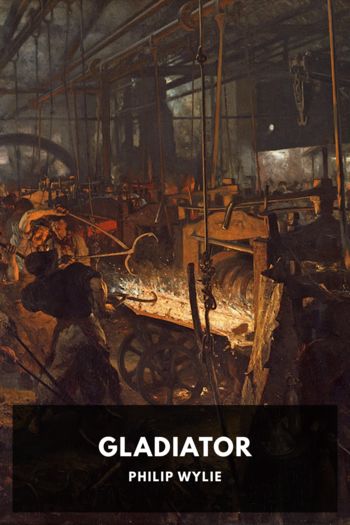Gladiator - Philip Wylie (readnow .TXT) 📗

- Author: Philip Wylie
Book online «Gladiator - Philip Wylie (readnow .TXT) 📗». Author Philip Wylie
In the morning he followed the road into the hills. Long stretches of woodland were interrupted by fields. He passed farmhouses and the paved drive of an estate. More than a mile from the deserted farm, more than two miles from the main road, half hidden in a skirt of venerable trees, he saw an old, green house behind which was a row of barns. It was a big house; tile medallions had been set in its foundations by an architect whose tombstone must now be aslant and illegible. It was built on a variety of planes and angles; gables cropped at random from its mossy roof. Grass grew in the broad yard under the trees, and in the grass were crocuses, yellow and red and blue, like wind-strewn confetti.
Hugo paused to contemplate this peaceful edifice. A man walked briskly from one of the barn doors. He perceived Hugo and stopped, holding a spade in his hand. Then, after starting across to the house, he changed his mind and, dropping the spade, approached Hugo.
“Looking for work, my man?”
Hugo smiled. “Why—yes.”
“Know anything about cattle?”
“I was reared in a farming country.”
“Good.” He scrutinized Hugo minutely. “I’ll try you at eight dollars a week, room, and board.” He opened the gate.
Hugo paused. The notion of finding employment somewhere in the country had been fixed in his mind and he wondered why he waited, even as he did, when the charm of the old manor had offered itself to him as if by a miracle. The man swung open the gate; he was lithe, sober, direct.
“My name is Cane—Ralph Cane. We raise blooded Guernsey stock here. At the moment we haven’t a man.”
“I see,” Hugo said.
“I could make the eight ten—in a week—if you were satisfactory.”
“I wasn’t considering the money—”
“How?”
“I wasn’t considering the money.”
“Oh! Come in. Try it.” An eagerness was apparent in his tone. While Hugo still halted on a knoll of indecision, a woman opened the French windows which lined one façade of the house and stepped down from the porch. She was very tall and very slender. Her eyes were slaty blue and there was a delicate suggestion—almost an apparition—of grey in her hair.
“What is it, Ralph?” Her voice was cool and pitched low.
“This is my wife,” Cane said.
“My name is Danner.”
Cane explained. “I saw this man standing by the gate, and now I’m hiring him.”
“I see,” she said. She looked at Hugo. The crystalline substance of her eyes glinted transiently with some inwardness—surprise, a vanishing gladness, it might have been. “You are looking for work?”
“Yes,” Hugo answered.
Cane spoke hastily. “I offered him eight a week and board, Roseanne.”
She glanced at her husband and returned her attention inquisitively to Hugo. “Are you interested?”
“I’ll try it.”
Cane frowned nervously, walked to his wife, and nodded with averted face. Then he addressed Hugo: “You can sleep in the barn. We have quarters there. I don’t think we’ll be in for any more cold weather. If you’ll come with me now, I’ll start you right in.”
Until noon Hugo cleaned stables. There were two dozen cows—animals that would have seemed beautiful to a rustic connoisseur—and one lordly bull with malignant horns and bloodshot eyes. He shoveled the pungent and not offensive debris into a wheelbarrow and transferred it to a dung-heap that sweated with internal humidity. At noon Cane came into the barn.
“Pretty good,” he said, viewing floors fairly shaved by Hugo’s diligence. “Lunch is ready. You’ll eat in the kitchen.”
Hugo saw the woman again. She was toiling over a stove, her hair in disarray, a spotted apron covering her long body. He realized that they had no servants, that the three of them constituted the human inhabitants of the estate—but there were shades, innumerable shades, of a long past, and some of those ghosts had crept into Roseanne’s slaty eyes. She carried lunch for herself and her husband into a front room and left him to eat in the soft silence.
After lunch Cane spoke to him again. “Can you plough?”
“It’s been a long time—but I think so.”
“Good. I have a team. We’ll drive to the north field. I’ve got to start getting the corn in pretty soon.”
The room in the barn was bare: four board walls, a board ceiling and floor, an iron cot, blankets, the sound and smell of the cows beneath. Hugo slept dreamlessly, and when he woke, he was ravenous.
His week passed. Cane drove him like a slave-master, but to drive Hugo was an unhazardous thing. He did not think much, and when he did, it was to read the innuendo of living that was written parallel to the existence of his employer and Roseanne. They were troubled with each other. Part of that trouble sprang from an evident source: Cane was a miser. He resented the amount of food that Hugo consumed, despite the unequal ratio of Hugo’s labors. When Hugo asked for a few dollars in advance, he was curtly refused. That had happened at lunch one day. After lunch, however, and evidently after Cane had debated with his wife, he inquired of Hugo what he wanted. A razor and some shaving things and new trousers, Hugo had said.
Cane drove the station wagon to town and returned with the desired articles. He gave them to Hugo.
“Thank you,” Hugo said.
Cane chuckled, opening his thin lips wide. “All right, Danner. As a matter of fact, it’s money in my bank.”
“Money in your bank?”
“Sure. I’ve lived here for years and I





Comments (0)